Jackson ends drought as Chelsea boost top five push
Since his appointment as head coach in October 2016 with China rock bottom of their Asian zone World Cup qualifying group, the Italian has presided over a resurgence that saw just one defeat in six matches, 1-0 away to runaway group winners Iran.
Back-to-back wins to finish the campaign, at home to Uzbekistan and a comeback 2-1 win when down to 10 men at 2022 hosts Qatar on Tuesday, have sent a wave of cautious optimism across fans and officials.
It was not enough for the world’s most populous nation to continue on the path to Russia next year as they fell just one point short of reaching the playoffs.
But it was enough to keep alive the dream of one day again reaching the finals and of fulfilling the ambition of China’s President Xi Jinping to host the global showpiece.
“Since Marcello Lippi has been leading the team, the changes have been huge,” said Chinese Football Association president Cai Zhenhua of the man who led Italy to World Cup victory in 2006.
“The most noticeable is that the players are now able to express themselves on the pitch and that their confidence is growing.
“The ability of the players to carry out the coach’s plans and tactics has clearly improved.”
– Lack of passion –
Still many pundits contend that the national team’s ambitions will continue to be hampered by mediocre coaching, poor funding choices and lack of passion at the grassroots.

Chinese Super League clubs splashing huge amounts of cash to import foreign strikers such as Oscar, Carlos Tevez and Alexandre Pato does not help.
Angela Smith, head of international projects at English Premier League club Stoke City, who have opened academies in China, said while Chinese clubs are “buying strikers, they are not thinking about the development of the whole team”.
“If you don’t develop the whole team, you are just constantly going to be paying money out to other countries, and the game will never develop from the grassroots levels in clubs and academies,” she said.
China aspires to have 40,000 football schools by 2020, up from the current 13,000.
But all the academies in the world will not be enough if youngsters lack passion, according to Luiz Ferreira, the Portuguese director of youth training at Chinese Super League (CSL) club Tianjin Teda.
“During a training session, I asked my young players: ‘How many of you watched the Champions League final?’ It was just one out of three. They just don’t care about it,” he said.
He added that it would probably “need time” to develop a deep-seated love for the game as found in Europe and South America.
The country is no longer hiding the desire to host the FIFA World Cup in 2030, for which Argentina, Uruguay and Paraguay have just submitted a joint bid.
However China languishes at 77th place in FIFA’s world rankings, just behind Sierra Leone, and only eighth in Asia.
– Upbeat assessment –
Football in China has been overseen by the Communist regime since the 1950s, and only really took off in the middle of the 1990s, with the creation of professional clubs.
Mads Davidsen, technical director of CSL Shanghai SIPG, said it could be another 15-20 years before China can compete with the world’s best.
Davidsen said he had recently attended a football training session in China for eight-year-olds where “the level of the players was at least at the same level as I have seen in Europe — maybe even better.

China’s Gao Lin celebrates after scoring against Uzbekistan on August 31, 2017.
“Good training is therefore taking place from the earliest stage. Considering that 28 years is the best football age, China still needs 15-20 years to have a competitive national team,” he added.
China have only made it to the World Cup once, in 2002, when they failed to win a point or even score a goal.
But under the wily 69-year-old Lippi, who has pledged to stay through to the 2019 Asian Cup, there are signs that China are on an upward trajectory at last with newspapers delivering upbeat assessments after the World Cup exit.
“Marcello Lippi’s team departed with the battered pride of the country’s footballing reputation all but restored,” declared the Shanghai Daily.
“For a nation with ambitions to be a major power within the game, there were positives to be gleaned.”
Download our app